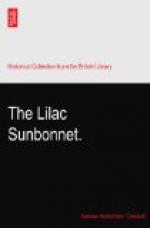Ralph lay long on his bed, on which he had lain down at full length to think out his plans, as his custom was. It did not mean to leave Winsome, this call to Edinburgh. His father would not utterly refuse his consent, though he might urge long delays. And, in any case, Edinburgh was but two days’ journey from the Dullarg; two days on the road by the burnsides and over the heather hills was nothing to him. But, for all that, the aching would not be stilled. Hearts are strange, illogical things; they will not be argued with.
Finally, he rose with the heart of him full of the intention of telling Winsome at once. He would write to her and tell her that he must see her immediately. It was necessary for him to acquaint her with what had occurred. So, without further question as to his motive in writing, Ralph rose and wrote a letter to give to Saunders Mowdiewort. The minister’s man was always ready to take a letter to Craig Ronald after his day’s work was over. His inclinations jumped cheerfully along with the shilling which Ralph—who had not many such—gave him for his trouble. Within a drawer, the only one in his room that would lock, on the top of Ralph’s poems lay the white moss-rose and the forget-me-nots which, as a precious and pregnant emblem from his love, Saunders had brought back with him.
As Ralph sat at the window writing his letter to Winsome, he saw over the hedge beneath his window the bent form of Allan Welsh— his great, pallid brow over-dominating his face—walking slowly to and fro along the well-accustomed walk, at one end of which was the little wooden summer house in which was his private oratory. Even now Ralph could see his lips moving in the instancy of his unuttered supplication. His inward communing was so intense that the agony of prayer seemed to shake his frail body. Ralph could see him knit his hands behind his back in a strong tension of nerves. Yet it seemed a right and natural thing for Ralph to be immersed in his own concerns, and to turn away with the light tribute of a sigh to finish his love-letter—for, after all (say they), love is only a refined form of selfishness.
“Beloved,” wrote Ralph, “among my many promises to you yester even, I did not promise to refrain from writing to you; or if I did, I ask you to put off your displeasure until you have read my letter. I am not, you said, to come to see you. Then will you come to meet me? You know that I would not ask you unless the matter were important. I am at a cross-roads, and I cannot tell which way to go. But I am sure that you can tell me, for your word shall be to me as the whisper of a kind angel. Meet me to-night, I beseech you, for ere long I must go very far away, and I have much to say to thee, my beloved! Saunders will bring any message of time or place safely. Believing that you will grant me this request—for it is the first time and may be the last—and with all my heart going out to thee, I am the man who truly loves thee.—Ralph Peden.”




